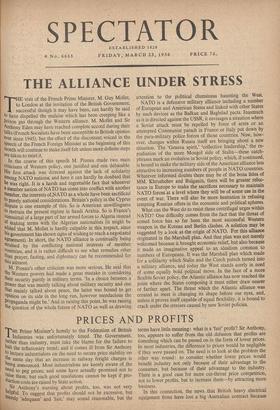THE ALLIANCE UNDER STRESS
irHE visit of the French Prime Minister, M. Guy Mollet, to London at the invitation of the British Government, successful though it may have been, can hardly be said to have dispelled the malaise which has been creeping* like a Poison gas through the Western alliance. M. Mollet and Sir Anthony Eden may have reached complete accord.duting their talks (French Socialists have been susceptible to British opinion ever since 1945), but.the effect of the discontent voiced in,the speech of the French Foreign Minister at the beginning of this month will continue to make itself felt unless more definite steps are taken.to meet it.
In the course of this speech M. Pineau made two main criticisms of Western policy, one justified and one debatable. Its first , attack was directed against the lack of solidarity among NATO nations', and here it can hardly be.doubted that he was right. It is a harsh and regrettable fact that whenever a Member nation of NATO has come into conflict, with another menaber, the, interests of. NATO as a whole have been sacrificed to Purely, national considerations. Britain's policy in the CYprus dispute is one example of this. So is American unwillingness to restrain the present regime in Saudi Arabia. So is France's e°Inniittal of a large part of her armed forces to Algeria instead Of Making terms with the Algerian nationalists (it might be added that ,K Mollet is hardly culpable in this respect, since his government has shown sighs of wishing to reach a negotiated agreement)..In short, the NATO alliance is continually being 'trained by the conflicting national interests of member ,eountries, and it is rather\ difficult to see what remedies other 'ht) prayer, fasting, and diplomacy can be recommended for this ailment.
., M. Pineau's other criticism was more serious. He said that the Western powers had made a great mistake in considering uleir security _purely in military terms. 'In a choice between a ' Power, that was mainly talking about military security and one that mainly talked about peace, the latter was bound to get °Pinion on its side in the long run, however mendacious the the might be.' And in raising this point, he was raising `ne question of the whole future of NATO as well as drawing. attention to the political clumsiness haunting the West.
NATO is a defensive military alliance including a number of European and American States and linked with other States by such devices as the Balkan and Baghdad pacts. Inasmuch as it is directed against the USSR, it envisages a situation where a Soviet attack must be repelled by force of . arms or an attempted Commonist putsch in France or Italy put down by the para-military police forces of those countries. Now, how- ever, changes within Russia itself are bringing about a new situation. The 'Geneva spirit,"collective leadership,' the re- pudiation of the more Mongol side of Stalin—these catch- phrases mark an evolution in Soviet policy, which, if continued, is bound to make the Military side of the American alliance less attractive to increasing, numbers of people in NATO countries. Whatever informed doubis there may be of the bona fides of MM. Khrushchev and Bulganin, there will be greater reluc- tance in Europe to make the sacrifices necessary to maintain NATO forces at a level where they will be of some use in the event of war. There will also be more hesitation in refusing tempting Russian offers in the economic and political spheres.
What can the West do.to resist these centrifugal urges within NATO? One difficulty comes from the fact that the threat of armed force has so far been the most successful Western weapon in the. Korean and 'Berlin clashes. A solution may be suggested by a' look at the origin of NATO. For this alliance originated in the Marshall plan.. And that plan was not merely welcomed because it brought economic relief, but also because it made an imaginative appeal to an idealism common to numbers. of Europeans. It was the Marshall plan which made for a ,solidarity which Stalin and the Czech putsch turned into ak military alliahce, and today the West stands sorely in need of some equally bold political move. In the face of a more flexible. Soviet policy, the Atlantic alliance has now reached the point where the States composing, it must either draw nearer or farther apart. The threat which the Atlantic alliance was created to meet is changing its shape before our eyes, and, unless it proves itself,capable of equal flexibility, it is bound to crack under the stresses caused .by new Soviet policies.


































 Previous page
Previous page